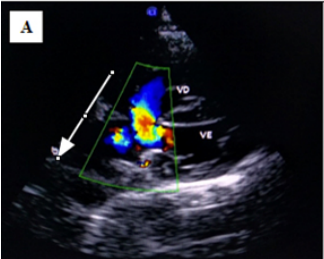Echocardiographic diagnosis of interventricular septum defect with Eisenmenger syndrome in an adult dog - case report
DOI:
https://doi.org/10.21708/avb.2022.16.1.10159Resumo
Interventricular septal defect (IVSD) is a congenital heart disease characterized by communication or non-closure of the interventricular septum in the embryonic or postnatal period, causing a failure in the separation between the systemic and pulmonary circulation. The severity of the hemodynamic consequences depends on the extent of the defect and the magnitude of the flow through it. Blood flow commonly occurs from left to right, because systemic vascular resistance is greater than pulmonary resistance. This report describes the echocardiographic findings in a 4-year-old male Poodle treated at the Veterinary Hospital with a history of exercise intolerance, cyanosis and episodes of syncope. On echocardiography, perimembranous IVSD was diagnosed with atrial and right ventricular dilatation, discontinuity of the interventricular septum in the subaortic region measuring approximately 5 mm. In the Doppler evaluation, reverse turbulent flow was evidenced, characterizing shunt from right to left (Eisenmenger syndrome). Despite preserved systolic function, abnormal relaxation was observed. Doppler echocardiography was a fundamental complementary imaging test for the diagnosis of this congenital heart disease since its suspicion is not commonly raised in adult patients. Doppler echocardiography allowed us to identify the defect, define its size and extension, determine the direction of blood flow as well as its hemodynamic consequences.
Downloads

Downloads
Publicado
Edição
Seção
Licença
Autores que publicam na Acta Veterinaria Brasilica concordam com os seguintes termos: a) Autores mantém os direitos autorais e concedem à revista o direito de primeira publicação, com o trabalho simultaneamente licenciado sob a Licença Creative Commons Attribution que permite o compartilhamento do trabalho com reconhecimento da autoria e publicação inicial nesta revista. b) Autores têm autorização para assumir contratos adicionais separadamente, para distribuição não-exclusiva da versão do trabalho publicada nesta revista (ex.: publicar em repositório institucional ou como capítulo de livro), com reconhecimento de autoria e publicação inicial nesta revista. c) Autores têm permissão e são estimulados a publicar e distribuir seu trabalho online (ex.: em repositórios institucionais ou na sua página pessoal) a qualquer ponto antes ou durante o processo editorial, já que isso pode gerar alterações produtivas, bem como aumentar o impacto e a citação do trabalho publicado (Veja O Efeito do Acesso Livre).


 Esta obra está licenciada com uma Licença
Esta obra está licenciada com uma Licença 